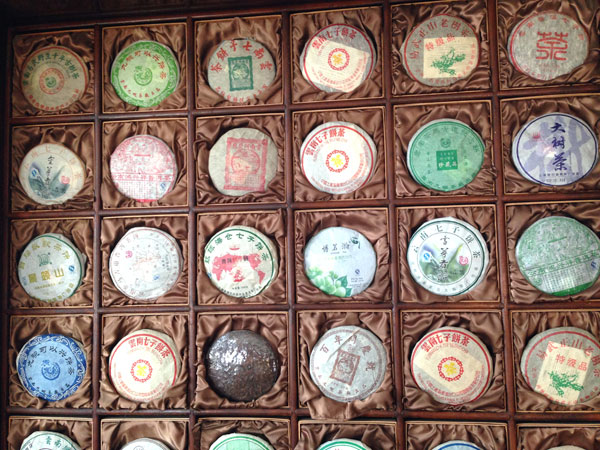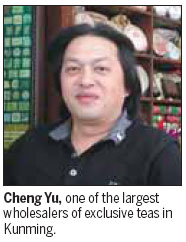 |
|
Cakes of pu'er tea are collector's items, carefully kept and aged like fine wines. [Photo/China Daily]
|
It's no different now, although rare are the rough brews thrown together in large copper pots meant only to quench the thirst of the sweaty manual class.
Instead, there is a whole new order, where leaves are carefully classified according to taste, terroir and the ting-a-ling of cash registers and whole new support industries are flourishing alongside catering to the new tea connoisseurs.
New kilns and old kilns are producing tea wares that range from rustic ceramics to delicate porcelains. There are tea pots of every size and shape, cups as delicate as eggshells, tiny jugs that allow the brew to breathe before being poured into cups, holders that support tea colanders, ewers that hold tea cups between brews, tea urns that store the leaves
| Special Coverage |

|
Then there are the tea slabs and tables made from blocks of sculpted tree roots and slabs of black stone and marble.
For a price, tea connoisseurs can enjoy their tea-making with the full paraphernalia, although tags are seldom fewer than four figures and the zeroes may stretch to hundreds of thousands of yuan for the true collectors.
Tea is big business. And the collectors and connoisseurs are willing to pay.
In Kunming, the capital of Southwest China's Yunnan province, specialist shops display tea tables created from ancient tree roots, mostly imported from Myanmar. The tabletops are smoothed and carved, and matching stools make it a set. The going price for a good set is no less than 10,000 yuan ($1,629), and the better woods can cost up to 100,000 yuan.
Tea slabs sculpted from a single block of black stone start from 5,000 yuan upward.
In Kunming, too, the tea merchants are laughing all the way to the bank, especially those who have had the foresight to bank up on stocks of pu'er tea.
Orders are pouring in all over the country and from abroad.
Even outside China, specialist teashops are mushrooming all over the United States, Europe, Australia and even Africa.
They sell loose-leaf teas in boutiques that are educating the world on how to appreciate teas like Dragon Well tea plucked before the spring rains, monkey-harvested silver needles, peony-scented white teas and the furry buds of the gigantic ancient pu'er tea trees from southern Yunnan.

Cheng Yu, a middle-aged wholesale tea merchant in Kunming, is a major supplier to these teashops. His family's Jiuwan Tea has its own factory and tea plantations, and Cheng is a one-man reference library on all things tea.
In fact, he is so respected that he is quoted often in the locally published Encyclopedia of Yunnan Tea, where his family business has an entire chapter to itself.
Ed Grumbine, 56, a research scholar with the Chinese Academy of Sciences at the Kunming Institute of Botany, was drinking black tea from China back in the United States long before he arrived to work here.
As soon as he had settled in Kunming, he started exploring the city's famous wholesale tea markets, which are more like tea towns. He soon found a tutor in Cheng Yu.
Grumbine took us to visit Cheng recently, and it proved an extremely educational experience.
There was a huge motorcycle outside Cheng's shop, a 1,800-cu-cm monster with upholstery that looked as if it was hijacked from a car. Images of Jack Kerouac on the road in designer jeans refuse to fade.
We recommend:
